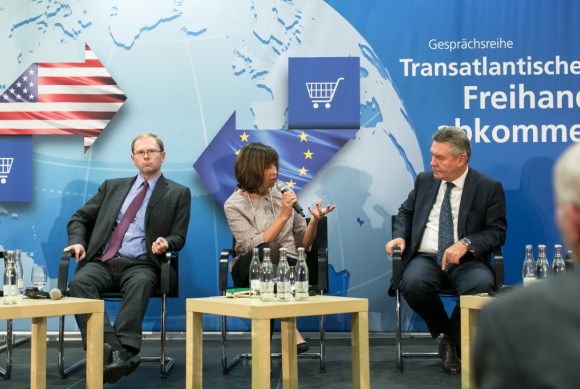Event report: TTIP on the defensive

Atlantic Community | 16 October 2014
Event Report: TTIP on the defensive
Christopher Huppertz
Opponents of any agreement now control the agenda. This has become quickly apparent at an event in Berlin last week featuring leading stakeholders of the Transatlantic Trade and Investment Partnership (TTIP). Outgoing Trade Commissioner Karel de Gucht and MEP for the Greens Rebecca Harms, among others, discussed how we reached this level of deep-rooted public skepticism, and where to go from here.
To discuss the most ambitious transatlantic endeavor of recent years, Prime Minister of Lower Saxony Stephan Weil hosted outgoing Trade Commissioner for Europe Karel de Gucht, leading MEP of the Greens Rebecca Harms, and James A. Boughner, minister council for economic affairs at the US embassy, to participate in the debate "Transatlantic Free Trade Agreement USA:EU – where to go from here" moderated by Dr. Ursula Weidenfeld. Right from the start, it was evident that the point of concentration would not be promoting the benefits of the agreements as much as trying to stem the tide of negative public opinion by putting the most controversial aspects of the agreement into context: Investor-State Dispute Settlement (ISDS) and regulatory harmonization.
Prime Minister Stephan Weil’s introductory remarks captured the essence of this problem by highlighting the many benefits in juxtaposition to the many questions regarding any potential agreement. Most importantly however, he stressed the character of the latter: there is no "free lunch," Weil said, and criticism has to come in the form of questions to be addressed in the negotiations, not blunt demands calling for the cancellation of the whole process.
On the Origins of and Responsibility for the Public Outcry Surrounding TTIP
Outgoing Trade Commissioner Karel de Gucht expressed his frustration by stating that the "first question" for member states must be if they are "fundamentally for, or against TTIP." As it is not possible for the Commission to cater to the public of 28 states, the members should take up responsibility and cease dealing with it only "from the sidelines."
In response, MEP Harms remarked that the Commission clearly underestimated the degree to which TTIP would arouse public scrutiny. The planned agreement is not just about eliminating mere "unnecessary bureaucracy," as Mr. Boughner suggested, but rather about "how we want to shape our societies." Thus, Ms. Harms sees the lack of clearly defined goals by the Commission as the driving force behind public scrutiny.
On Regulatory Harmonization
The differences in perception became even more pronounced on the actual content of the agreement. Mr. de Gucht underlined the existence of EU legislation regarding standards and regulation that cannot be altered by any free-trade agreement, as can be seen in CETA. Mr. James Boughner tried to alleviate concerns by stressing that American standards are not generally inferior and that the maintenance of scientifically sound regulation will be a priority on par with securing economic benefits.
One poignant example — one that often serves as a rallying cry for the opposition in much the same way as chlorinated chicken does — was that of fracking. Here, Mr. Boughner stressed that it is a common misperception to think that fracking is legal everywhere in the US while being illegal everywhere in the EU. While it may be tempting to cast the issue in black and white, legislation is in fact ambivalent and leaves implementation to individual states in both the EU and US.
Ms. Harms argued against shallow dismissal of regulatory concerns. "Cultural differences" in approaching these issues are not easily bridged. While she acknowledged that "TTIP is not really about fracking," she went on to underscore that it nevertheless deals with areas of very real concern like securing cultural subsidies and the precautionary principle. Here, as before, the MEP expressed concern for the fact that clear goals for this sweeping undertaking are lacking, as she wondered how one can integrate large markets for industries such as agriculture without tinkering with standards and regulation.
On ISDS
On the topic of investment protection, MEP Harms was joined by Prime Minister Weil in her concerns about establishing a secondary, supranational and extra-constitutional process of arbitration. "The EU Commission did not invent ISDS," responded Karel de Gucht, "and neither did the US". Instead, the EU member states adopted it for TTIP by unanimously accepting the now publicized mandate. In fact, as Mr. Boughner pointed out, EU members are very adamant in the usage and inclusion of ISDS in investment treaties between themselves, but expect the US to "trust some countries more than you do yourselves." On the necessity for investment protection between established democracies, both Karel de Gucht and Mr. Boughner highlighted the strategic dimension of TTIP, as it is meant to serve as a benchmark treaty for the future. Hypocrisy, said Mr. Boughner, is not an option. Nevertheless, the trade policy expert also stated that the US is open to negotiating possible reforms, as it itself had a lengthy public consultation on the subject from 2009 to 2012. Mr. De Gucht added that even without ISDS, "states would always be responsible for their actions" in front of commercial courts. "Vattenfall," he said, "would still be happening."
With regard to Mr. de Gucht’s and MEP Harms’ respective positions, Mr. Weil concluded: "only one of you can be right." This, however, is precisely what is wrong with the debate on TTIP: casting the positions as polar opposites. Concerns should influence the negotiations and not be cause for their immediate abandonment. In the end, it will say a lot about our political culture, and transatlantic relations, if we prefer stonewalling.
Christopher Huppertz works as an editor for atlantic-community.org





